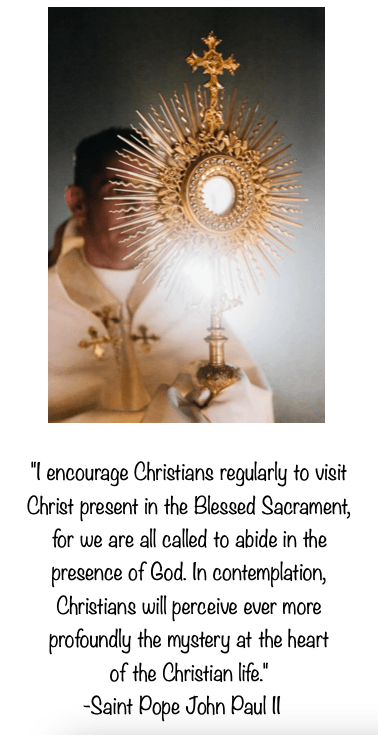Prayer & Adoration
Spend some time with Jesus in Eucharistic Adoration
Every Thursday from 6pm-7pm at the chapel at Our Lady of Consolation with guided prayers led by a Deacon. Once a month at Our Lady of Consolation Church, including a short reflection by Fr. Steven Caraher, live praise and worship music, and silent prayer time. Upcoming dates: Thursday, March 21 from 6pm-7:15pm ad Friday, April 25 from 7pm-8:15pm.
Why Adoration? Catholics believe that during the Mass the priest prays specific prays, following Jesus' command and through the authority of the Apostolic priesthood, ordinary bread and wine become consecrated. Through the miracle of transubstantiation, the bread and wine which we offer as the bloodless sacrifice of our Lord truly become the Body, Blood, Soul, and Divinity of Jesus. We have the opportunity to sit in the presence of God. While it is true that God is always with us, there is something peaceful about sitting in His presence in the Eucharist.
What happens during Adoration? At the beginning of the holy hour, the priest or deacon takes a consecrated host, and places it in a monstrance. Monstrance comes from the Latin "monstrare", meaning to show, to expose to view. The monstrance is then placed in front of the tabernacle (an ornate box which holds the monstrance and any consecrated hosts) or on the altar of the church or chapel for adoration. We sing a song to praise God at the beginning and at the end of Adoration. Sometimes there is a short reflection lead by a deacon or priest; followed by a period of silence.
What do I do in Adoration? Adoration means that you can have some time alone with Jesus to recite your favorite prayers; read the Bible; contemplate acts of faith, hope, charity, thanksgiving, and/or reparation; pray a Rosary; or do whatever type of prayerful devotion that suits you before Our Lord. You can just sit and say nothing, simply keeping Him company, just as you would with a dear friend.

Traditional Prayers
Prayer is essential to living a full, Catholic life. The central communal form of prayer for the Church is the Mass. Some of the Church’s most traditional and foundational prayers are:
Grace before Meals
Bless us, O Lord, and these your gifts which we are about to receive from your goodness, through Christ our Lord. Amen.
The Lord’s Prayer
Our Father, who art in heaven, hallowed be thy name; thy kingdom come, thy will be done on earth as it is in Heaven. Give us this day our daily bread, and forgive us our trespasses, as we forgive those who trespass against us; and lead us not into temptation, but deliver us from evil. Amen.
Hail Mary
Hail, Mary, full of grace. The Lord is with you. Blessed are you among women; and blessed is the fruit of your womb, Jesus. Holy Mary, Mother of God, pray for us sinners, now and at the hour of our death. Amen.
Glory to the Father
Glory to the Father, and to the Son, and to the Holy Spirit: as it was in the beginning, is now, and will be forever. Amen.
Act of Contrition
My God, I am sorry for my sins with all my heart. In choosing to do wrong and failing to do good, I have sinned against you whom I should love above all things. I firmly intend, with your help, to do penance, to sin no more, and to avoid whatever leads me to sin. Our Savior Jesus Christ suffered and died for us. In his name, my God, have mercy.
Hail, Holy Queen
Hail, holy Queen, Mother of mercy, hail, our life, our sweetness, and our hope. To you we cry, the children of Eve; to you we send up our sighs, mourning and weeping in this land of exile. Turn, then, most gracious advocate, your eyes of mercy toward us; lead us home at last and show us the blessed fruit of your womb, Jesus: O clement, O loving, O sweet Virgin Mary.
There are also contemporary ways to pray. Talking with God each day, no matter the form or words used, nourishes our relationship and helps it to grow.
- Silent prayer or meditation helps us center our thoughts on God’s goodness and offers renewal in a noisy, hectic world.
- Lectio Divina is a way of praying with the sacred Scriptures. Find a Scripture passage that speaks to you. Read it out loud and then reflect upon it silently for several minutes. Read it again. Notice any words or phrases that stick with you. Ask God what you are to learn from this passage. Listen.
- Keep a prayer journal with all of your wants, needs, thoughts and reflections related to your prayer life.




